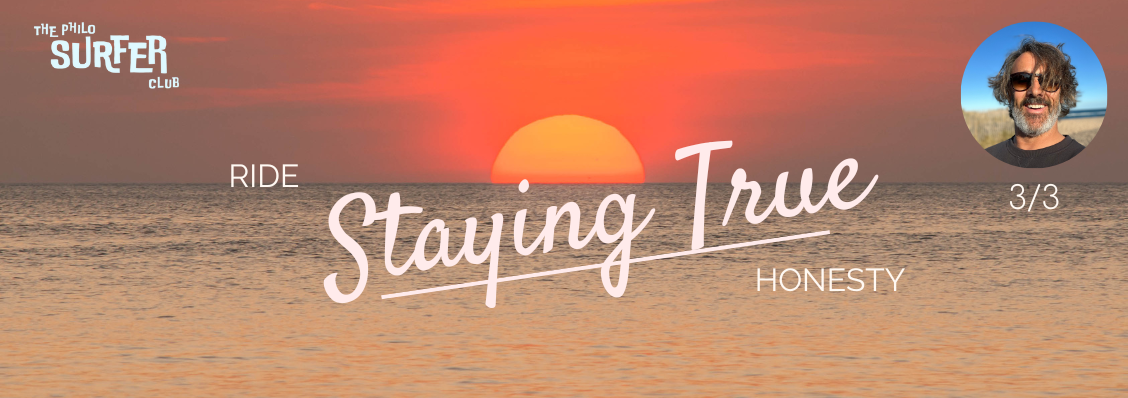Aloha, PhiloSurfer!
This last week I’ve been sharing with you one of my biggest fears.
Namely, wasting my life without even noticing.
As Thoreau wrote:
“When it’s time to die, let us not discover that we have never lived.”
I dunno if life has meaning. But not knowing what to do with it & just wasting it would surely be a universal loss.
And we don’t want that.
At all!!!

Are You Misliving?
Thus, my obsessive question of this week has been:
How can you tell you’re living, not misliving?
You know:
MIS-LIVING: to live badly or sinfully.
That’s the most thought-provoking English word. Imo.

Examining Your Life
It all boils down to Socrates once more.
The examined life.
Knowing your principles.
And living accordingly.
So I turned to philosophy once more.
And philosophy answered with a line from a song:
“It’s About Time”
(Still figuring out if it was from the Beach Boys’ song or from the Lemonheads’ that philosophy sung to me)
Time As A Line

How you conceptualize time has profound implications, existential, moral, and even ecological (as we are about to see).
Heraclitus, the Obscure, famously said (I am quoting by heart, so you’ll have to excuse me if the original quote might be slightly different):
“No surfer ever rides the same wave twice, for it’s not the same wave, and she’s not the same surfer.”
What did he mean?
- 💧 everything flows (Panta rei, in Greek)
- ⚡️ change is the only constant in this Universe.
- 🤙🏻 you’ll never be the one you’re today.
That’s a calling to take action, as in the Horatian maxims:
- Tempus fugit
- Carpe Diem
Or in more modern terms:
YOLO B*TCHES!
He’s also conceptualizing time as a linear, continuous current.

Time As A Loop
On the other hand, the Stoic philosophers’ concept of time was cyclical:
Based on the idea of the:
Eternal return or the eternal recurrence of the same.
An eternal, ever-repeating loop:
- There will be an end of time
- The world will disappear in flames
- There will be a rebirth
And then a repetition of the same. Over and over. Like some techno tracks.
That idea of time as an infinite loop inspired:
– the Groundhog Day movie.
– Nietzsche to develop the most urgent call to action for improving your life.
A Thought Experiment Against Misliving

The eternal return can be better understood as a thought experiment with moral consequences:
- Picture what you’re doing now. Your life. Your career. Your family and friends.
- Imagine an eternal repetition of the same. Not for a week or two. Forever.
- Depict a whole eternity of repetition of the exact very same thing.
Now answer with bold sincerity:
How does this make you feel?
Would you do it for evermore?
- If the answer is yes, congratulations! You’re LIVING the right way.
- If not, you’re MISLIVING. And this is an urgent call for you to embrace vitality and change something in your existence!!
In “Beyond Good and Evil”, Nietzsche calls “life-affirming” attitude of those who answer yes, as all surfers do after a perfect 6-9 feet session with offshore winds.

Bonus Section
There’s even another interpretation of these concepts of time, an ecological one, and that’s totally mine (now the academic philosophers are the ones that will have to excuse me):
- If you consider that you’ll never be the same surfer again, you might feel excused to take care of the ocean.
- If, on the other hand, you think that the world might end up in flames, you will not want to be the one burning it down. And doing it forever more in an eternally repeating loop.

No shortcuts to Good Life. Embrace it, love it, juice it.
The Journey ALWAYS starts with Self-Reflection
Don’t pòstpone it no more.
TL;DR
Life’s sand beach falling through your fingers. What’s next?
Mahalo for reading.
May the swell be with you!
(copyright by my friend Miguel Paninho for the best surfer closing line)

PS. Phil vs Phil
(Connors vs Groundhog)
Ok, I admit it. I asked ChatGPT to do the next table. Finally I found a way to make AI work for me.
It contains the different strategies Phil Connors tried to break the loop of Groundhog Day. Nietzsche would have loved it. I hope.
But this table is completely useless.
But ain’t that cool?
| Day | Action Attempted | Result | People Involved |
|---|---|---|---|
| 1 | Attends Groundhog Day celebration | Ordinary day, nothing significant | Townspeople, Rita |
| 2 | Repeats the same day | Confused and disoriented | None |
| 3 | Eats excessively | Feels full, no lasting impact | Rita, Ned |
| 4 | Saves a choking man | Saves the man’s life | Rita, Townspeople |
| 5 | Learns to play piano | Becomes proficient at piano playing | Rita, Mrs. Lancaster |
| 6 | Helps a couple with a flat tire | Couple gets angry | Rita, Larry, townspeople |
| 7 | Tries to commit suicide multiple times | Wakes up unharmed | Various townspeople |
| 8 | Robs an armored truck | Gets caught and arrested | No one involved |
| 9 | Learns to ice sculpt | Creates impressive ice sculptures | Rita, townspeople |
| 10 | Confesses love to Rita | Rita rejects him | Rita |
| 11 | Kidnaps Punxsutawney Phil | Result not shown | Phil (groundhog) |
| 12 | Learns to speak French | Impresses townspeople with French | Townspeople, Mrs. Lancaster |
| 13 | Befriends and helps homeless man | Homeless man grateful | Homeless man, Rita, townspeople |
| 14 | Steals money and drives recklessly | No lasting consequences | Rita |
| 15 | Rescues a boy from falling tree | Heroic act, boy saved | Boy, townspeople, Rita |
| N | Shows genuine love and kindness, fully embracing the present moment | Breaks the time loop, wakes up on the following day | Rita, townspeople, others |
ChatGPT NOTE: “Please note that the table contains a few examples, but the movie shows many more actions attempted by Phil Connors on different days.”

Additional recommendations:
- “Apology of Socrates” by Plato – This classic philosophical work recounts the defense made by Socrates during his trial in ancient Athens. As Socrates faces charges of corrupting the youth and impiety, he delivers a powerful speech, expressing his beliefs, philosophy, and unwavering commitment to truth and wisdom. The Apology provides valuable insights into the life and teachings of one of history’s most influential thinkers.
- “Breath” by Tim Winton – Set in Western Australia, “Breath” is a coming-of-age novel that follows the journey of two teenage boys, Pikelet and Loonie, who become obsessed with surfing. As they explore the exhilarating and dangerous world of big-wave surfing, they form an intense bond with an older surfer named Sando, leading them to confront their own fears and desires. Winton’s evocative writing captures the essence of surfing and the complexities of youth, adventure, and self-discovery.
- “The Gay Science” by Nietzsche – In this philosophical work, Nietzsche explores various themes, including the death of God, the eternal recurrence, the concept of the Übermensch (Superman), and the importance of embracing life’s joys and sorrows. The book is known for its poetic and aphoristic style, making it both profound and thought-provoking.
- “Thus Spoke Zarathustra” by Nietzsche – This iconic philosophical novel follows the journey of Zarathustra, a prophet-like figure, as he seeks to impart his wisdom to the people. The book delves into the concept of the Übermensch, the eternal recurrence, and the idea of self-overcoming. Nietzsche presents his vision of a higher form of human existence through powerful allegories and memorable speeches.
- “Beyond Good and Evil” by Nietzsche – In this critical and groundbreaking work, Nietzsche challenges traditional moral values and explores the notions of good and evil. He calls for reevaluating values, emphasizing the importance of individual freedom and creativity. The book serves as a critique of modernity and an invitation to embrace life on one’s own terms.







